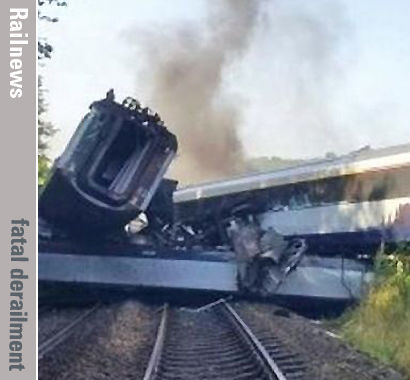THE ScotRail train which was derailed south west of Stonehaven on Wednesday had abandoned its journey to Glasgow Queen Street and was returning to Aberdeen, the Rail Accident Investigation Branch has revealed.
After some contradictory speculation over the past two days, it has now emerged that the 06.38 from Aberdeen was on time. It had already passed the site of the later derailment and was continuing towards Glasgow when the signaller at Carmont warned the driver by radio that a landslip had been reported on the up line ahead of the train, between Carmont and the next station at Laurencekirk.
The train was then reversed on to the down line, using a crossover at Carmont, and started its journey back to Aberdeen.
After travelling for about 2.25km, the train struck a landslip on the down line, which derailed it.
The RAIB continued: ‘As the track curved to the right, the train continued in a roughly straight line for around 90 metres until it struck a section of bridge parapet, which was destroyed. The leading power car continued over the bridge and then fell from the railway down a wooded embankment, as did the third passenger carriage. The first passenger carriage came to rest on its roof, having rotated to be at right angles to the track. The second passenger carriage also overturned on to its roof and came to rest on the first carriage. The fourth passenger carriage remained upright and attached to the rear power car; it also came to rest on the first carriage. All wheelsets of the rear power car derailed, but it remained upright.’
Chief inspector Simon French added: ‘Thankfully, fatal derailments are a rare occurrence on the UK’s national network. However, landslips and other earthworks failures remain a risk to trains that needs to be constantly managed – and this is becoming even more challenging for the rail industry due to the increasing incidence of extreme weather events.
‘We have an expert team at the site of the derailment who are the gathering the evidence that is needed to understand what happened, and why. They share my determination to pursue every line of enquiry, to analyse the evidence, and to identify important safety learning.’


